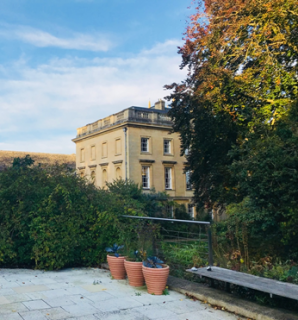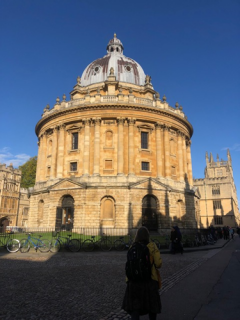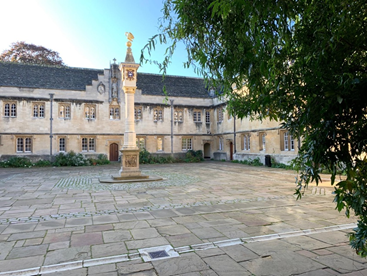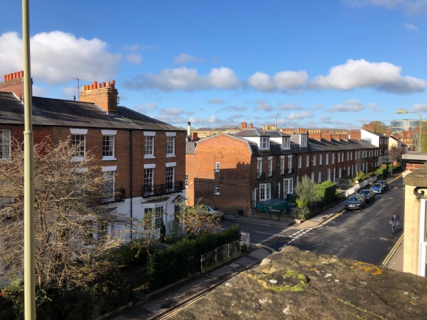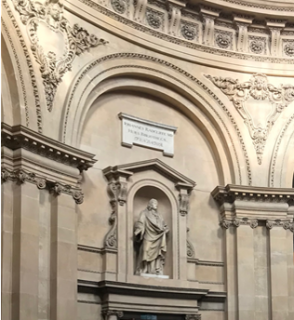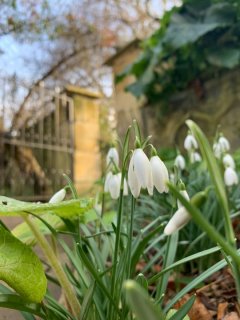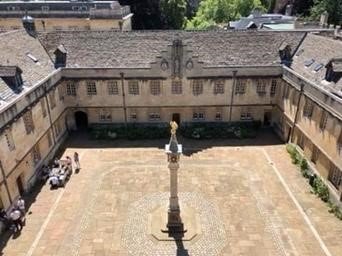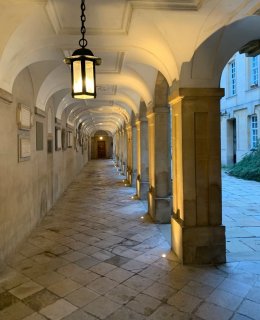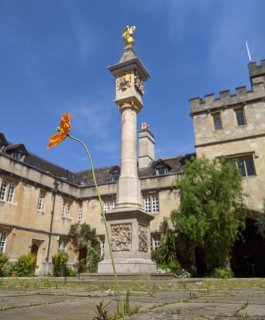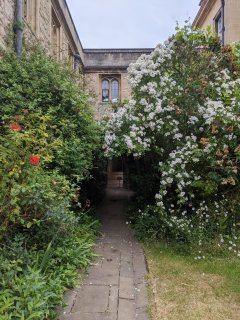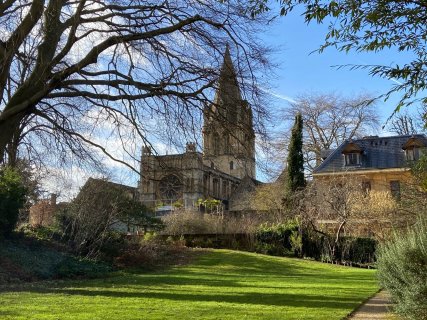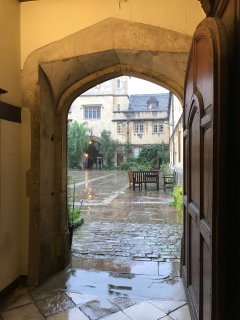Intro
Corpus Christi is a community that welcomes anyone and everyone. We like to think we take ideas seriously, but don't take ourselves seriously. No matter your background, if you are interested in law, we are interested in you.
For more opportunities to learn about law at Corpus Christi, enter our Legal Reasoning Essay Prize and read about our annual Online Spring Workshops (please email the Admissions and Outreach Team for more information).
The students, teachers and alumni of the College have been keeping a weekly law diary, in 2019-20, and 2017-18, recording what life has been like living lives in law. We hope it will provide some insight for those interested in law, university, Oxford, and of course, Corpus.
Law Diary Entry - Michaelmas 2019
- Week 0 MT 2019
-
This week’s entry is from Lorren Eldridge, Corpus’ Graduate Teaching Assistant. Lorren is doing a doctorate in legal history and is also part of Corpus’ law community as our tutor for two undergraduate subjects, land law and contract law.
It’s the start of the year! It might seem like academics get a long summer holiday, especially at Oxford where the terms are short, but the summer goes fast when you’re presenting at conferences, finally getting time to do serious archival research and writing, and (if you’re lucky) taking a short holiday somewhere in the mix. The undergraduates are coming back part way through this week, with the first years having a few days as a “freshers’ week”, and then second and third years arriving after. My teaching will pick up again and I will, like most DPhil students, juggle my research work with my teaching. I like teaching though, as it means that I get a break from the pressure of trying to write my thesis to use a different skill set. It keeps me on my toes as a lawyer, too: I did an Oxford law degree before training as a solicitor, but now my research is all about historical law - so I could easily lose touch with new cases and developments without my perceptive undergraduates’ tricky questions to keep me on my toes.
On Monday, I start my day with a language class to help with my research, since my research involves more than just English. I am taking a three-week intensive course at the moment, and it’s demanding. This is the last week, and it’s both a heavy workload and more structure than I am used to now – it reminds me of being an undergraduate again. After class, I deal with some admin relating to the new year and complete the written work for my next language class at 2pm – I have had two classes every day for the last two weeks. One of the big differences between being an undergraduate and being a graduate for me, especially one whose previous degree was a while ago, is juggling more life admin than the average undergraduate whilst trying to think and write and teach. In the afternoon I head home to visit my most important stress management tool for my DPhil: my dog, who will morally support my attempt to do yet more language work.
The rest of the week has the same schedule, but I like to move around different libraries: the Corpus library is excellent, but especially now undergraduates need the space more for their start of term “collections” (essentially mock exams). My second years especially will probably not enjoy seeing me in there right before they sit the contract law collection I set them on Friday. I might try the Radcliffe Camera, All Souls’ history and law focused library, or if I want true quiet, Duke Humfrey’s library in the Old Bodleian.
Tuesday I stop working at 1pm and have lunch at college. One of the best things about my job is that I get to eat meals with the college fellows, which means you get to hear about their research and pick up all sorts of advice and reflections on being a university tutor. When I have a difficult day, dinner with the members of the Corpus SCR (“senior common room”) can improve my mood a lot. Today an eminent visiting scholar in a field related to mine is joining us for dinner so I hear about some fascinating work past and present, too.
On Wednesday, Freshers’ flu strikes. I miss my language classes and stay at home. Because terms are so short, the undergraduates suffering from the same problem from next week will have to power through their work or fall behind quickly, and I have the same problem in order to keep up with them. I try and get as much rest as possible whilst doing the minimum of emailing to keep on top of things, and a sniffly version of me manages to make it to Freshers’ dinner in college with the new first years on Friday. It’s been nearly a year since we interviewed the new students last December, but we will soon get to know them very well as we teach them and watch them grow. The Corpus dining hall is filled to the brim with new students and their tutors. As someone who went to state schools, and who was the first person in their family to go to university, the Harry Potter feeling of a full hall hasn’t worn off for me yet, which is fine with me!
Image: A hummingbird hawk moth enjoys the college garden in the summer sunshine.
- Week 1 MT 2019
-
This week’s entry is from second year undergraduate law student Hannah Taylor.
It’s the first week of term! All the undergraduates arrive back the week before term officially starts (known as ‘0th week’) but the normal tutorials, reading lists and lectures don’t start until the following week. It’s always quite hectic getting back to the jam-packed Oxford routine after 3 months of summer!
I finished my collections on the Friday of 0th week, so it is a quick turn around for my first Trusts tutorial on the Monday of 1st week. I find starting a new module exciting, but it always takes me a little while to really get my head around all the new concepts and cases. This tutorial was very theory-based, focussing on the role Equity has to play in English law. This was super interesting and hopefully laid a good foundation for the rest of the course! Written work is a part of most of the tutorials at Oxford but often the tutors will give you a couple of tutorials without essays throughout the term. We didn’t have any written work for this tutorial, which was a nice way to ease us back into the rhythm of things.
On Tuesday my lectures start again. The Oxford system means that lectures do not always align with what you are studying at any given time, so I am attending Contract, Tort, Trusts and Land lectures across this term. Tort and Trusts are my modules this term, and I find attending the lectures super helpful for comprehending the reading. We will study Land Law next term, but to get a feel for the subject through lectures is a nice way to make it feel slightly more familiar when we start!
The rest of the weekdays are largely taken up with reading and writing for the two essays I have due in 2nd week for Tort and Trusts. I find the work always takes longer at the beginning of term when you have had a few months without having to read the volume of literature the reading lists require, but it just takes getting stuck in to get you back to where you were! I’m living out of college this year, so I try to go into Corpus every day to see everyone, and try to maintain a separation between work in college and being at home to relax and catch up with everyone who I haven’t seen since Trinity Term. I really like working in the Corpus library – it is absolutely beautiful and always nice to work with friends around you!
As well as work starting up again, all of the other commitments and extra-curricular activities you do get going in 1st week. Outside of my work I enjoy coxing and debating. Unfortunately, the good old English weather meant that no crews were allowed out for most of the week, and I’ve really missed it! Corpus has a very active boat club and anyone of any level can join, so I have learned to cox while I am here. I also had debating on Saturday evening, which was nice to get back into after the summer break. I am also the Returning Officer (counting the votes in meetings) in the JCR and we had our first meeting back after term on Sunday, so it has been all go this week! I am looking forward to settling back into a routine (very busy) Oxford lifestyle over the next few weeks.
Image: The Fellows Building and college gardens in autumn.
- Week 2 MT 2019
-
This week’s entry is from Julia Laganowska, who is a third-year law undergraduate.
It’s quite astonishing how quickly time flies at university. One moment you’re a fresher, enjoying all the unknowns, and then suddenly you’re a third-year, coming back from your summer holidays to finals looming on the horizon. There’s this feeling amongst us all of trying to make the most of the last terms at Oxford, whilst getting in as much study time as possible. Not an easy balance to strike, but definitely achievable.
My week is quite packed with seminars, lectures and tutorials. This is because I’m doing one full subject and half of two other courses. Third year subjects are particularly interesting as we got the choice of picking two ‘options’, and so far everyone I have spoken to says it has worked to their advantage. With the core subjects, I found it to be a bit ‘hit or miss’: there were ones I enjoyed significantly less than others, which always seemed to affect my work ethic. Now however, even though the workload is at times less than ideal, there isn’t much complaining as you chose the options you are genuinely interested in. I’m taking the advanced criminal law and media law courses, and I’m not lying when I say this is the most fun I have had going through the reading lists. The ‘option’ subjects are also a great way of meeting new people – although the college system is amazing it allows you to make close friends across different subjects, it does mean there is less opportunity to get to know other people doing your subject. For lawyers, the only time you see everyone in your year is at lectures (and that’s if everyone attends…). Option subjects, however, are seminar based, with groups of around 25 people, meaning you get to work and spend time with a new group of peers.
The third subject I am taking this term is EU law, especially interesting with Brexit as a constant topic of discussion. Coming from a different EU Member State, I’m finding it very engaging not only to learn about the approach the UK takes towards implementing EU law, but also to compare it to that taken by Poland. My tutor has been very accommodating, to the point of allowing me to write an essay based on the recent developments and the constitutional crisis in Poland, which fit in with our tutorial on EU law supremacy and fundamental rights.
I do find myself in the library more often this term than others, but you can’t only spend your time studying. Oxford has a lot to offer both in terms of extracurriculars and career planning opportunities. On Sunday my friends and I spent a nice evening in the board game café, as a way to de-stress before the start of the week. Wednesday found me attending an Inns of Court event, held at Oxford Brookes University. It was an introduction to the aspects of becoming a barrister one may not necessarily be aware of and a great opportunity to find out more about all 4 Inns, with the representatives happy to answer any question. On Friday, I got to celebrate my friend’s 21st birthday by attending a formal hall dinner, the celebrations all the better for the amazing food and chance to dress up. On Saturday, the weather was quite grim, with constant rain and a sudden drop of temperature, but that did not stop the members of CCC Boat Club, and four outings in total took place. My second one may have ended with a small case of frostbite, but it’s impossible not to have fun with the other members of W2 (Women’s boat 2) always joking around. Sunday, however, was a beautiful (although quite chilly) day and after getting through my work due Monday (an advanced criminal law seminar on general principles of criminal law – it felt quite nice to see that I still remember something from my first year criminal law course), my friends and I spent the rest of the day in the College gardens and walking around Christ Church Meadow. As my family back home always jokes, you need to make the most of sun in England – I don’t have the heart to tell them it rains just as much back home as here.
Image: The Radcliffe Camera in the sun.
- Week 3 MT 2019
-
This week’s entry is from Christopher Stackpoole, a postgraduate research student studying for an MPhil in law.
It is week three of Michaelmas Term. Although it is mid-Autumn, the cold morning breezes are an early herald of the coming Winter in Oxford, making my morning walk less preferable to another hour’s bedrest. But coming from Australia, arriving in Oxford City is always a pleasant experience, with its magnificent architecture and obvious history.
I am now studying for the research degree of Master of Philosophy in Law (MPhil) after having completed the taught masters called the Bachelor of Civil Law (BCL). That means two things. First, I spend a lot of my time sitting in on some interesting BCL classes, such as Jurisprudence and Political Theory and Philosophical Foundations of the Common Law, that I was unable to undertake during the BCL due to timetable restrictions. There is nowhere better than Oxford to learn about legal philosophy. Second, I spend the rest of my time in studious reflection about exactly what it is that I want to say on the subject matter about which I am supposed to be writing.
I use the word ‘reflection’ with some intent. The object of my research is legal doctrine, and so it must be accountable to the positive law. However, my aim is to construct an intelligible framework in which our legal ideas in a particular area of law might be situated, and to connect those ideas with our moral lives. Although legal doctrine consists in part of empirical facts, they can be created, amended, and abolished, aim to guide human behaviour, and both reflect and reconstruct our moral and social norms. And so, even doctrinal scholars must not only ask what law is but whether it is a good law, and against what criteria we, as a society, consider that a law should be adjudged ‘good’.
Corpus Christi is a most excellent college in which to engage in such reflection. It has truly beautiful gardens, with species of plants from across the world. And it has elevated seating areas where you can overlook nearby colleges, sporting ovals, and gardens. Its library is well-resourced, quiet, and comfortable. But perhaps it is the ornate and elaborate detail of the architecture of the College which leaves the first, and most lasting, impression.
This weekend we had celebrations for Guy Fawkes. Although rain fell, as it so often does at this time of year, the darkened sky was ignited with colour from the fireworks released throughout Oxfordshire. And these colours illuminated the ancient buildings of the colleges of Oxford, as a great bonfire burned in the South Parks. It is times like these that one recalls the words of Hilaire Belloc: that there are few greater temptations in life than to remain forever at Oxford.
Image: Some Halloween pumpkins - both Halloween and Guy Fawkes' night are causes for celebration in Oxford.
- Week 4 MT 2019
-
This week’s entry is from Rhys Surtees, a first year law undergraduate.
It feels almost surreal to be sat writing an entry regarding a week four of Michaelmas term, I can’t honestly decide if this is because it feels as though I have been at Corpus for a long while, or barely a minute. By this I mean that studying at Corpus Christi, and Oxford in general, has been such a whirlwind of positive experiences in both the academic and social senses, and time can feel like it’s flying by. Equally, I feel like I am settling into the routine and demands of Oxford and beginning to feel more accustomed to the style of work and life here, which makes me feel as if I have been here a considerable length of time.
My week began with a constitutional law tutorial at Wadham College. One thing you shouldn’t be worried about at Oxford is being bound to the academic confines of your college - though each college, especially Corpus, has amazing tutors, you are lucky to be able to draw on a wide range of tutors across Oxford. This can be through tutorials such as this one, but also lectures and other academic events organised by the law faculty or law societies. I enjoyed the constitutional lecture in which we talked about the doctrine of separation of powers, particularly in relation to debate about Brexit and the related recent constitutional cases, articles.
My workload always feels immense, but when I break it down and begin tackling my reading in a focused manner it is achievable. The three subjects all Corpus first years will study in the first and second term are Roman Law, Constitutional Law and Criminal Law. I am thankful that we study them concurrently, unlike some colleges (who only do one and a half subjects in the first term and the other one and a half after Christmas) as I gain a lot from using lectures to supplement my knowledge from reading, and that helps me write essays. I also find lectures give me a good set of structured notes, a valuable asset to build on. I found in the first few weeks the lectures for all three subjects were quite general in content, and didn’t go far beyond the reading. However, now the lectures are becoming more specific and the lecturers are varying, particularly for constitutional law, and I have started started to gain a much more comprehensive understandings of different approaches to, and principles in, law. One downside of the high workload is that it can bar you from going to the many other subject related events on offer, for example I had to prioritise criminal reading this week over a law society event I really wanted to attend.
I have always enjoyed exploring extra-curricular activities, so I was excited about this part of coming to Oxford too. At college level I am trying to start rowing, and although I have been too busy to do the circuit training sessions, I am hopefully going out on the water this weekend. The biggest extra-curricular commitment for me is my acapella group: ‘Out Of The Blue’, with whom I spent this week’s Tuesday, Thursday and Sunday evenings rehearsing. Though it can sometimes lead to greater time pressure for work, it is definitely worth it and not unmanageable. Overall, week four was busy, especially with two tutorials fairly close together (Monday and Thursday) but I still managed to fit in some time to go to the gym, which takes my mind away from work for a while. Roll on week five!
- Week 5 MT 2019
-
This week’s diary entry is from Will Andrews, a third year law undergraduate.
Home to the ‘fifth week blues’, the fifth week of term is known for being a tough bump when the days have grown shorter and there is still a considerable amount of work left to get through before we get time off for Christmas. I must say, however, that despite the cold and rainy weather it has been a very enjoyable week.
I am a third year student moving rapidly towards final exams, and am studying three courses this term as opposed to the standard two throughout the course so far. In addition to completing our final mandatory subject (EU law) we have begun our optional subjects, which have so far been very interesting and rewarding. For my options I chose Environmental Law and Moral and Political Philosophy (MPP).
I have wanted to study and practice in environmental law right from when I made my application to study at Oxford and the course has not disappointed! The course is run by Prof. Liz Fisher at Corpus and Dr. Joanna Bell at St. Edmund’s Hall, who have so far put together some wonderful seminars on the theoretical underpinnings and planning law aspects of environmental law. Having one of the UK’s foremost environmental law academics, textbook writers and tutor in Prof. Fisher at Corpus is an absolute privilege and a reminder of how lucky we are to be students at Oxford and at a college like Corpus.
As for MPP, it has been a very refreshing move away from Public and European Union law and towards topics such as Aristotle, Kant and Utilitarianism. I have been attending seminars at Balliol which has provided a nice opportunity, as Julia said above, to meet new students in the faculty and to explore a new college.
On Monday I started the day with a second year lecture on tort theory: I have been doing my best to attend lectures on modules I have already completed to kickstart the revision process and to get some older concepts back into my head before finals. I then worked on an environmental law essay which was due in at 5pm for a tutorial the next day (it may have been a few minutes late…). Then, in the evening, I had Ice Hockey practice (a means for me to exercise my Canadian heritage) to burn off some steam.
On Tuesday, I read for and attended an environmental law tutorial which focused on the planning law aspects of environmental law and protection, with particular focus on the private/public interaction with regards to planning policy. It was nice to revisit some tort law here in the interaction between planning law and private nuisance. After the tutorial I spent a nice evening cooking and relaxing with my housemates.
Wednesday morning began early with an Ice Hockey practice at 7am, a nice way to start the day. I then headed home and prepared for an MPP seminar on Aristotle and virtue ethics at Balliol that afternoon. I had a nice walk through Christ Church meadow as it got dark, in the cold with the river overflowing from recent rain.
Thursday and Friday were reasonably busy with lectures, a seminar, and reading for two tutorials early next week. I went to some really interesting EU law lectures on the free movement of goods and constitutionalism, followed by some more revision lectures on contract law on Thursday. It had been ages since I had spent much time on contract so it was nice to dip back into it. Friday, I had an environmental law seminar and then, when our college Football match was cancelled, I headed to the Oxford golf course with a friend for what we though would be a nice round of golf. However, it turned out that the golf course was more strict on apparel than we realised - we only made it to the third hole before we were sent home to find ourselves some proper trousers and golf shoes…I was only one over par through two holes, though, so I counted it as a win all things considered.
Saturday was an Ice Hockey game day. We travelled by coach to play Cardiff and eeked out a 1-0 which made the late coach trip back more bearable. Sunday, I read for and wrote an MPP essay on Utilitarianism for my tutorial on Monday. All round a nicely varied and non-blue fifth week - amazingly there are now only 3 weeks left in term, hopefully only partly spent reading through this overly long journal entry!
Image: Somewhat rare sun on Walton Street on a beautiful, cool day.
- Week 6 MT 2019
-
This week’s entry is from Chantelle Richter, a second year law undergraduate.
Now that it is 6th week, I am officially ¾ of the way through Michaelmas term! This term has gone so quickly that I did not even experience 5th week blues.
My weeks always begin with an afternoon trusts tutorial at Lincoln College. Our tutor for trusts is a fellow Corpuscule (someone who studied at Corpus when they were an undergraduate). At the moment, my tutorials are on Trusts and Tort. This is my first term of second year, but I already began studying Tort at the end of first year because a few Oxford subjects take their first-year exams in second term rather than third term. Most of my time studying is spent in Radcliffe Camera, an infamous library, which most Oxford students abbreviate to the ‘radcam.’ I also spend some time in the Bodleian Library but only if my friends force me to go (I have an inexplicable bond with the ‘radcam’).
Wednesday is my busiest day of the week because I study both Law and French Law. I have French classes from 2-5pm. In first year, our classes were only 1.5 hours but now that I am in second year the classes are longer and more intense, as our teachers are trying their hardest to make sure we are prepared for our year abroad next year. The classes are normally easy to follow, unless you lose focus for a minute, then it’s really difficult to catch up on what the teacher has said in French.
On Thursday, I attend gymnastics with my twin sister (she has just started studying at Wadham college) and our friend. Taking part in sports at University is a great way to relax and meet new people.
The weekends are the best part of the week for me because it means I don’t have to wake up to the sound of an alarm clock. College brunch is a great way to start a Saturday morning and catch up with friends after a Friday night. I try to get as much work done as possible during the week so that I have more time off on Saturday and Sunday. I am normally more social on a Saturday. By Sunday, I am exhausted and cannot wait to attend Corpus Cinema Club at 9pm, which always shows the best films and accompanies them with snacks.
Image: The statue of John Radcliffe inside the Radcliffe Camera.
- Week 7 MT 2019
-
This week’s entry is from Sampada Sudheesh Venkatesh, a first year law undergraduate.
It’s seventh week already, and almost the end of term! My week was quite intense (and as I’m starting to learn, every week here is!), but I do feel a nice sense of satisfaction when I finish the week and look back on how much I have achieved. I tend to work in the Corpus library, but sometimes like a change of scene and spend my time in the Law Library in the Law Faculty instead. This is especially so when the weather forecast of the day isn’t very promising (and unfortunately in this country, that’s quite often!) because then I can move between lectures and the library without having to make the 15 minute walk between them.
As a first year, I study 3 subjects this term. This means that we run on 2 week cycles, having a tutorial in each subject once every 2 weeks. So, seventh week was the start of the last cycle of term. I spent the first half of the week reading in preparation for my Roman Law tutorial at Corpus on Wednesday. For the tutorial I also had to write an essay on property in Roman Law, particularly on the relationship between ownership and possession. The second half of the week went in reading for constitutional law, where we are currently studying parliamentary sovereignty. I am also finishing up an essay on it, which is due ahead of the tutorial at Wadham College on Monday of eighth week.
I particularly like the schedule of tutorials at Corpus in first year because of its well-structured approach which allows me to devote 3-4 days on a single topic. This is very important because each tutorial builds on previous ones, so it’s very helpful to be given sufficient amounts of time to spend on each topic. Moreover, studying law for the first time can get very overwhelming and so it is great to have your schedule already made for you in the best possible manner. While the 2 week cycle and having essays due on Sunday evening might mean that you may not always have a free weekend, I instead try taking a break on the evening of the day of my tutorial and spend time with friends, stock up on groceries, or do my laundry!
I think one of the best things about being at Oxford is the many opportunities around you that complement your academic learning. On Tuesday, a London law firm hosted a dinner for members of the Frederick Pollock Corpus Law Society. I really enjoyed the evening, and had the chance to interact with and learn about what kind of work the firm does from one of their partners, who happens to also be a Corpuscle! On Thursday, I attended a lecture and conversation with an international legal diplomat from Pakistan, hosted by the Oxford South Asian Society. As someone who hopes to pursue a career in the same field, it was great to hear his perspective on international law and conflicts in South Asia.
Apart from this, I am a member of the university badminton team, so I attended a couple of training sessions. We also had elections for some of the Junior Common Room (JCR) committee positions this week, and I won the post of International Students Officer - a role that I am very excited about as I get to involve myself in the college community!
That’s all from me - looking forward to the last week of term and then getting back home to India!
Image: Sunshine coming in through the windows of the gorgeous Corpus library.
- Week 8 MT 2019
-
This week’s entry is from Sahima Sajid, a third year law undergraduate.
Week 8 marks the end of term and as clichéd as it sounds time has flown by! On the Sunday a couple of friends and I went ice skating, which was fun - although falling on ice was not as fun. The day ended with all of us getting a takeaway and watching a Christmas film, which was a great way to de-stress and approach the rest of the week.
I spent most of Monday and Tuesday doing the reading for my essay on the legal approach to sexual offences. This was part of one of my optional subjects for this year - Advanced Criminal Law. I enjoyed studying Criminal Law in my first year, so it’s great to be able to study it in more depth as a finalist.
On Wednesday I had my last tutorial of the term at Exeter college. Although I have had many tutorials in Corpus, I have also had the chance to have tutorials in other colleges, too. As has been mentioned by other lawyers, it’s a great way to meet other law students as well as getting to visit other colleges!
I then spent most of Wednesday and Thursday catching up on Medical Law and Ethics (my second option for this year) lectures. Medical Law is an exciting and incredibly relevant subject, that involves dealing with topical issues like IVF, surrogacy and patient autonomy.
Thursday ended with me going to the Christmas Formal dinner at Corpus with my friends. Christmas formal is slightly more special than usual formal dinners - apart from being a great excuse to dress up and have a fancy (Christmassy) meal, you also get to hear the choir sing and get crackers! Afterwards, we all went to the Beer Cellar (the Corpus Bar) and I got to talk to friends I hadn’t seen in a while.
Friday meant it was the annual Law Christmas Party. This is a highlight of Michaelmas Term for all lawyers, with lots of food and mulled wine, it’s not to be missed. It also meant that I could talk to many of the 1st and 2nd year lawyers I hadn’t seen in a while, which was lovely. We opened our crackers to find whistles, which resulted in us all whistling Christmas songs together. X-Factor watch out! Aside from the crackers all of us had a Christmas stocking with our name on (courtesy of our kind tutors). It’s always fun to see what the stockings contain, and this year didn’t disappoint. We then played some law related games - which were more fun than they sound. Since I’m a finalist this was my last Law Christmas Party, which meant I could take my Christmas stocking with me - a cool memento to mark my time in Oxford.
Saturday was officially the last day of term. This involved lots of packing and people leaving for the Christmas vacation, so a day of many goodbyes. I’m looking forward to spending time with my family over the vacation and relaxing after a busy term.
Image: A college bust of former tutor E A Lowe gets a festive cheer makeover.
This was the last week of Michaelmas term for students, but look out for bonus entries between now and the start of next term in January giving some insights from tutors, alumni, and graduate students.
- Week 9 MT 2019
-
This week’s entry is from Professor Liz Fisher, who is a fellow and tutor in Law at Corpus and specialises in Environmental Law.
Oxford terms are 8 weeks long. “9th week” then should perhaps not exist - but it does, and it is a busy week, particularly this term as it is the week we do admissions interviewing.
Monday
I spend the day doing a lot of administrative tasks - writing references for people who have requested them to help them with applications for jobs and other degrees, writing the end of term reports for students, preparing for admissions interviews later in the week, and other bits and pieces. I am also in the process of finishing off a book manuscript with a co-author. We have been working on the book for over 8 years and are now in the final stages. This is checking everything is in “house style” - meaning that it is formatted and the way the publisher of the book prefers, with the correct fonts, spacing, and other style features, and checking for typos. We have had an amazing research assistant helping us so there is relatively little to pick up. The evening is spent reading written work my doctoral students have sent me in preparation for Tuesday.
Tuesday
A busy day seeing a number of my doctoral students, teaching an E.U. law tutorial, and doing more preparation for admissions. Each doctoral student is working on their own project - which will eventually result in a 100,000 word thesis for each of them. It is hard and challenging work - and it can be quite lonely at times. My role as supervisor is to read through the work they send me carefully and to be a sounding board for their ideas. Each student I see is brilliant in their own way and doing inspiring and wonderful work. In the evening it’s more work on my own book - assembling the final chapters into a master manuscript.
Wednesday and Thursday
Admissions interviewing - these are the two most intense days of the year - we spend them interviewing a group of wonderfully talented applicants who are applying to study law on our undergraduate degree. We only have 7 places, so the choice is a very hard one. Interviews, while not the only thing taken into account, require 100% concentration from us as well as those we are interviewing. These are two long and busy days - although given how impressive the applicants are, it is also inspiring. We interview in pairs and each interview is primarily focused on asking the applicants questions about material they were given 30 minutes to read and think about prior to the interview. We don’t expect any applicant to know any law, so we assess the applicant’s application, reasoning, and communication skills. Each applicant has two interviews at Corpus before we make any decisions.
Friday
My book manuscript is finally assembled and now just needs to be checked off by my co-author. I have some more administrative bits and pieces to complete, but it is a nice end to a busy week.
Image: Dahlias in the Corpus garden.
- Week 10 MT 2019
-
This week’s entry is from alumnus Ryan Hyde, who is Governance Officer at EFL Trust, and graduated from Corpus in 2016.
EFL Trust is the official charity of the English Football League, and our work revolves around providing support and funding opportunities to each of the 72 official charities of the member football clubs in the EFL, known as Club Community Organisations (CCOs), in carrying out their work in their communities all across England and Wales. My role in particular involves supporting each of the CCOs in their work towards complying with the governance framework set up jointly by EFL Trust and the Premier League Charitable Fund, the Capability Code of Practice (CCOP), which was recently ‘Highly Commended’ for the award of ‘ICSA Governance Project of the Year’ at the ICSA Governance Awards, losing out only to HSBC for their Global Governance Excellence project. I am also heavily involved in our internal governance at EFL Trust.
The week began with what felt like a rare day in the office! The next deadline for CCOs to submit evidence demonstrating compliance with CCOP was only a couple of weeks away, so emails and phone calls were flooding in with queries about what is required for individual recommendations. There are fourteen different areas covered within CCOP, ranging from Governance to Communications and Safeguarding to Strategy, so the requested support from each CCO always varies significantly. Additionally, the size of CCOs across the network can vary hugely, with the largest being multi-million pound organisations with hundreds of staff, all the way down to the smallest CCOs having only one or two members of staff, so ensuring the advice is always tailored to the CCO is absolutely key. Having spent most of the day dealing with these queries, I finished the day by preparing for the rest of the week ahead.
On Tuesday, I clerked our Audit and Risk Committee meeting. The Chair of our Audit and Risk Committee is the Director of Corporate Social Responsibility at the Professional Footballers’ Association (PFA), so the meeting was held at the PFA’s offices in Manchester. The committee were provided with updates on our risk register, an update on the performance of CCOs for Capability, the most recent management accounts and financial report, as well as a recent external audit that EFL Trust had gone through. At just three hours long, the meeting was completed in record time, so I then made my way to the train station and travelled down to Reading for my meetings on Wednesday.
On Wednesday morning, I had a meeting with the Community Trust Manager and Governance Officer at Reading FC Community Trust. As is true of many of our CCOs, Reading have typically performed very well for Capability, having engaged very well with the process and shown a genuine commitment to be fully compliant as soon as possible. This meeting was therefore just to help them ensure they could get completely over the line for full compliance in time for the next deadline. I then travelled across to Wycombe in the afternoon for a meeting with the Head of Wycombe Wanderers Sports & Education Trust. Wycombe are a CCO who have engaged really well with the process, but felt they needed a bit of extra support just to get a better understanding of what exactly they needed to do to ensure they could improve as much as possible prior to the deadline. Although only meeting for two or three hours, it was good to see how much benefit it was to the head of the trust, who now felt they would be able to complete the submission in time for the deadline. Following this meeting, I then travelled to Ipswich for my meeting on Thursday.
On Thursday, I had a meeting arranged with the Head of Community at Ipswich Town Community Trust. Ipswich have only just re-established their community trust in the last few months, and so I have been working very closely with them to help them get up to speed as soon as possible. For the purposes of Capability, we have agreed with Ipswich that they only need to submit evidence of compliance with the four priority areas within CCOP (Governance, Safeguarding, Finance and Health & Safety) for the upcoming deadline, as opposed to the entire code of practice. This is to allow them a reasonable amount of time to be able to work towards compliance with CCOP, while still ensuring that we can be confident in their ability to carry out their work in the community at this stage. During the meeting, I therefore focussed on the four priority areas with them, providing them with guidance and templates for the policies and procedures that they would be required to create and implement prior to the deadline. Although there is still a lot of work to be done, it has been great to see the progress made by Ipswich over the last couple of months, and I have no doubt that this will continue going forward.
On Friday, I had taken the day off work as I had been invited to represent EFL Trust at Shrewsbury Town in the Community’s annual gala – A Night to Flourish! Given that the role of EFL Trust is to support the CCO network, rather than directly carrying out the work in the communities, it is sometimes difficult to see the impact that the work you do is having on communities. As a result, attending an event like this, and hearing some of the incredible stories of how Shrewsbury Town in the Community has changed people’s lives, really reminded me of why what we do is so important. The story of one boy in particular, Ben, who has been involved with EFL Trust’s Every Player Counts programme, really did hit home just how big an impact the work we do has. If you have a few spare minutes, then please do take a look at this article and video of his story at https://www.shrewsburytowninthecommunity.com/bens-journey-efl-day-of-disabilities.
After what has been one of my busiest weeks since starting this job, it was certainly a relief to be able to get home on Saturday and spend the rest of the weekend in my hometown, hopefully recovering in time for yet more travelling next week!
Law Diary Entry - Hilary 2020
- Week 1 HT 2020
-
This week’s entry is from Roman Kenny-Manning, a second year law undergraduate.
It’s first term of the new decade! Like all undergraduate students, I came back the previous week to complete my collections (mock papers you get at the beginning of every term). Naturally, I would probably rather the first thing I had to do when I returned to Oxford after the Christmas break was not exams, but there is something about collections which throw you right back into Oxford life like nothing else. You do also begin to appreciate how useful it is that Oxford gives you this opportunity to refresh your memory and recap the material you covered in the previous term(s) in this way. All of this will never stop me moaning about them…just a bit.
This term we are starting two new subjects: jurisprudence (legal philosophy) and land law. Studying jurisprudence at Oxford is exciting since Oxford is the home of legal philosophy. It marks a departure from the type of learning involved in the other subjects: there are no cases for a start. Instead, jurisprudence is more theoretical, giving us the chance to form our own views on questions like ‘what is law?’. Land law is also different to the modules I studied previously. Land law is heavily statute based; however, cases are still a significant feature in the learning. Although I have only read some of the material for my first tutorial, I can already see that one of the brilliant things about land is its connection with the real world. The fact patterns that are coming up make it so engaging because you can really imagine or relate to someone you know being in that position. Starting a new subject is exciting. But it is also very humbling; the first reading list you come across you feel like you’re almost thrown back into your first ever tutorial, with a completely new set of material to get to grips with. Nevertheless, the legal skills that you learn throughout your time here leave you well-equipped to approach new topics with the confidence you need.
Work has not been the only thing keeping me busy at the start of term. I also play tennis for the Men’s Blues, so a fair chunk of my time during any week is taken up with training and playing matches. We play indoors which is a relief given the weather at the moment and we have to train hard next week in preparation for a league match against the ultimate enemy: Cambridge. I also sit on the Committee of the Tennis Club as alumni officer, so I am currently busy organising our annual alumni dinner as well as organising the different projects we have going on at the club like rebuilding our clubhouse. All very exciting. Seeing your friends after the break is one of the great things about coming back. I am currently living in a college owned house with 7 of my friends so we had a huge home-cooked dinner to celebrate returning after the 6-week break, all looking forward to the term ahead.
- Week 2 HT 2020
-
This week’s entry is from Sing Yeap, a third year law undergraduate.
The second-to-last term for finalists sounds overwhelming; if anything, it feels pretty surreal. To keep ourselves grounded while working on our degrees, my friends and I have been focusing on ways to stay mentally and physically healthy. Our tutors emphasise that going through the law final exams is like running a marathon; this means we run together, pace ourselves, and keep the faith. This week was part of that process.
Monday
I started Monday bright and early with lectures for both my “Options”, which are two third-year subjects that we get to pick for ourselves. I decided on Family Law and Company Law, two subjects aptly contrasted by the day’s lectures: both happened to be about protection, but one was concerning children and the other creditors.
The lecture on Child Protection highlighted the sheer number, and fragility, of balances that had to be struck in this area. How interventionist, or how supportive of parents should the law be? Where do we draw the line between speeding up processes and potentially overlooking a life-changing aspect of the case? These are tricky questions, especially since they involve children’s risk of abuse and neglect.
Protecting creditors, on the other hand, involves a range of strategies to reflect the many types of creditors a company has. From banks to victims of wrongdoing, they have diverse needs and fears, and are far from a homogenous mass! The lecture covered material which is relevant to more than one tutorial topic in the subject, which helped me draw many connections.
I also worked for a while in the Bodleian Law Library, which I enjoy for its spacious main floor illuminated by a grand skylight (currently being renovated), a perfect complement to the Corpus Library’s cosy, antique wood interior.
It was my turn to make dinner tonight: as we live on an off-site College residence, my flat has a dinner-cooking roster to ensure we all get home-cooked food daily. I always try to smuggle as many vegetables as possible into my meals, and what better conduit to use than a cheesy pasta bake?
Tuesday & Wednesday
These were mostly spent preparing for my EU law tutorial, which revolved around how EU courts examine the validity of acts carried out by EU institutions. For this tutorial we learnt about clementine growers, traditional winemakers, and whiting fishermen, among others! Having interesting claimants gives us an additional dimension to think about, such as the fates of these groups before and after the court cases, and the impacts of EU decisions or regulations on them. On a wider scale, we see just how extensive the impact of EU law is on everyday businesses and people.
Thursday
I Peer Supporters’ meeting, which occurs twice a term with Judith, our college Chaplain, and Midge, our nurse. We have been trained by the University Counselling Service and are part of Corpus’ Welfare Team, comprising of staff and student personnel who are ready to offer confidential support for anything affecting your life at Corpus.
My EU Law tutorial was shortly after and was also at Corpus, with Professor Liz Fisher. This was an exciting one where we had our assumptions completely turned on their head, as we went through how various contemporary attitudes and historical events shaped judges’ decisions, and how the same legislation changed in importance and use over time. Given that it was the day before the UK was to leave the EU, the tutorial ended on a slightly bittersweet, sobering note.
Before heading home, my tutorial partner and I managed to catch up briefly over ice-cream.
Friday
This week coincided with the Lunar New Year! To many of East Asian origin, including Chinese descendants like myself, the holiday is as significant as Christmas combined with American Thanksgiving. Friday in particular was the seventh day of the New Year, also known as Renri. In Chinese mythology, it was the day humans were created—so it’s everyone’s birthday! That was the perfect reason to meet up with two close friends from home who study at different colleges: we enjoyed a rare trip to the neighbourhood of Summertown for some delicious Chinese food to end off the week.
Image: Spring has truly sprung in the Corpus gardens, with snowdrops growing all over.
- Week 3 HT 2020
-
This week’s entry is from Rhiannon Percy, a first year law undergraduate.
This week is quite a quiet week for me – I only have one tutorial and one essay which is due on Sunday evening. This is a very welcome lull, and a well timed one, as at the end of this week is our annual Corpus Challenge! For the Corpus Challenge a large number of undergraduates from the Oxford and Cambridge colleges respectively named Corpus Christi travel to each other in alternating years for a day of competitions. The contests range from sporting events to quizzes and a law moot, and the day is finished with a dinner in the college hall and evening celebrations. That means that on Sunday, most of the JCR (“Junior Common Room” – meaning the undergraduate part of the college) will travel very early in the morning to our sister college in Cambridge for the day. Apparently, the mixed netball is viciously competitive, and I am looking forward to it.
At the weekend at the beginning of the week, I had visitors from home, and so Monday morning I broke my usual routine to take my friends to the Ashmolean museum, which the university’s museum of art and archaeology. I hadn’t made time to visit the Ashmolean by myself since coming to Oxford, but would highly recommend it. Once my visitors had gone home at lunchtime on Monday, I had a Roman Law lecture and I dropped off my Roman law essay (my tutor this term is also the lecturer) before going back to college for dinner.
The rest of the week was taken up by the reading for my next tutorial, occasionally interrupted by lectures. On Thursday morning, we attempted to go rowing, but the weather continues to work against us at the moment and it was too foggy.
On Friday night, I went to a ball at the Oxford Union (a debating club in Oxford, not to be confused with the student union, which is confusingly called OUSU instead) which I was (somewhat ill-advisedly) convinced to attend despite the busy weekend ahead.
On Saturday, for the first time in what felt like forever we were able to row in a real boat on a real river! The water level has been dangerously high for most of the winter and has prevented a lot of rowing practice, so this was an opportunity not to be missed. Lots of other rowing teams thought the same, which had the unfortunate side effect of making the river very crowded.
- Week 4 HT 2020
-
This week’s entry is from Kathryn Farrow, a law postgraduate studying Criminology.
I am currently in my first year as a DPhil student here, but this is my second year at Corpus; last year I undertook the MSc in Criminology and Criminal Justice. The change from studying for an MSc, which is heavily guided by your course tutors, to a DPhil, which is predominantly independent research, is quite a jump. My thesis focuses on the internal working culture of one particular police force, and the first year of my DPhil project will be spent preparing for the observational work I will be carrying out with them. This means filling out copious amounts of ethical approval forms, meeting with my point of contact in the police to discuss my ideas with her, and doing a lot of reading around my area of interest.
The biggest challenge for me as a fulltime student has been leaving the world of work after nearly ten years. I have moved from an incredibly structured environment to one in which my time is pretty much my own. But it also allows me the space to learn in my own way, as well as providing me with time for reflection. The aim of my DPhil is to produce a thesis of 100,000 words, and this week I began writing what I hope will be my first chapter.
As part of being an ESRC Grand Union scholar, I am required to undertake quantitative research methods training, which is essentially four hours of statistics class first thing on a Monday, every week. This does not come particularly easy to me, but the professor has a great way of explaining things that makes it just click. This is the one class a week that I have - aside from this, how I organise my time is completely up to me.
As I am on the entertainments committee for the MCR (the “Middle Common Room”, which is the postgraduate part of the college made up of Masters and Dphil students), this week I have spent a lot of time with the other entertainments officer planning a Valentine’s Day themed bop (college party), as well as an exchange dinner with Exeter College. These events provide a much-needed break from work, and give us all an opportunity to catch up and unwind after what is usually a fairly intense week.
One of the more difficult things about being a postgrad is juggling the various responsibilities this entails. Mine include my research, meeting with my supervisor, helping to run the entertainments team, finding time to go to the gym and my pilates classes, working at my part time job whenever I find the time, and seeing friends. The last of these is particularly important to me. One of the best things about being a postgraduate at Corpus is the MCR community, and it played a big role in me deciding to stay on and do a DPhil after my MSc. I try to drop by the MCR most days, to catch up with friends and take a break from my work. The warmth and friendliness of the college has been a huge bonus for me during my time at Oxford, and I'm more than happy to spend the hours I had intended for extra curricular activities to build and maintain the friendships that I hope will last me for a lifetime. Before embarking on my research, I’d heard that DPhil life can be very lonely at times, and I’m incredibly lucky to be able to say this has never been the case for me, thanks to the postgraduate community at Corpus.
Image: The Corpus Quad from the college tower
- Week 7 HT 2020
-
This week’s entry is from Jeremy Huitson, a 2018 law graduate from Corpus, who now works as a legal engineer for a contract management startup.
What does it mean to practise law? In the past this had a fairly obvious answer - you could either be a solicitor or a barrister. Perhaps, and much to the delight of any Corpus law academic, you’d eventually progress to being a judge and have to suffer the indignity of seeing your rulings torn apart on a daily basis by the academic community and their legions of overly-caffeinated students.
On a personal level, whilst I thought my degree was super interesting and wanted a job working around the law, I didn’t feel as drawn to the idea of being a solicitor or barrister. Those environments felt a bit too traditional, hierarchical and defined in scope. And perhaps it was also the contrarian in me - I wanted to do something different to everyone else!
One thing led to another, and after a multi-stage recruitment process I was hired as a legal engineer at Juro, a legal tech startup. Venture-backed legal tech businesses attracted more than $1bn in funding last year, with entrepreneurs disrupting legal processes that have remained largely the same for decades. These include processes like hiring lawyers, billing, contract review, and in Juro’s case, contract management.
So what does this all mean? To preemptively answer the obvious question - a legal engineer is at its essence someone who operates at the intersection of law and technology. They can come from either the legal or the tech sectors - what is required is an understanding of the processes of legal work and how these can be innovated and improved upon. It’s a role that didn’t really exist even five years ago, but roles like it are set to become increasingly commonplace and could soon form a mainstream career path for law grads, as the industry turns its focus to legal operations.
One of the main things that appealed to me specifically about Juro was the bold conceptual vision behind the future of contracts. Legal documents have been based on static files - paper, Word documents and PDFs - pretty much forever. The problem with these is that they aren’t built from structured data, so it’s hard to collaborate on them and to know their history. Compare something like Google Docs, which live in the cloud and let you revisit previous versions easily. This is what we’re trying to achieve for contracts at Juro.
Luckily for us, there are those that are buying into that vision. We have a real mix of clients, from high growth tech companies such as Deliveroo and Skyscanner, to more institutional enterprise clients such as Reach PLC, one of the largest publishing groups in the UK. We also just recently closed our Series A funding round (early stage startups pitch for funding via ‘rounds’ to allow them to grow ahead of revenue) with New York’s Union Square Ventures, a venture capital firm best-known for being early investors in Twitter. Things have been very fast paced!
A great thing about working for a software company is that much of the work you do is international - I’ve already visited our engineering team in Riga, and trips to Paris and Helsinki to consult with clients are in the pipeline. It’s all been super interesting and every day feels slightly different. I’m continually being given new surprises and problems to solve.
I’m really glad I’ve chosen the career path that I have, and I’d be very happy to speak to students that are interested in learning a bit more about the increasing availability of careers in legaltech, or just want to chat about the sector generally! You can find out more on the Juro blog.
Image: Jeremy Huitson and Jack Beadsworth, Corpus law graduates 2018, sitting in the MCR quad post-final formal
- Week 8 HT 2020
-
This week’s entry is from Heather Cowgill, a second-year undergraduate law student.
On Monday, I was at Wadham College for my last Jurisprudence tutorial with Sandy Steel. Studying at Corpus doesn’t mean you’re confined to it, in fact, there are plenty of opportunities to work at other colleges with other tutors for some subjects. In fact, as a first year, we’d been taught Constitutional Law by Oliver Butler at Wadham as well, and as I was leaving on Monday, I bumped into him! It was strange to realise how far I’d come since the last time I saw Oliver, I’m now halfway through my degree and looking at my options for after graduation, rather than a fresher, terrified about sitting her Mods (first year law exams)! After I got back to my accommodation, I finished up my notes on the tutorial and decided what Juris mini-option I wanted to do. Over this Summer, I’ll have to write an essay on legal philosophy, which will count towards my final grade. The option I made my first choice was Law and its Critics, which will involve studying the views of Marxists and Anarchists, which looked especially interesting to me.
Over Tuesday and Wednesday I began the work for my final Land Law tutorial, and I’m quite sad to finish Land, which has been one of my favourite subjects so far! On Wednesday I had a final end of term meeting with the other writers for the Oxford Women in Law Student Society. It was my first term writing for OWLSS and at the meeting we started planning the schedule for next term, while also discussing what ideas we had or what articles needed writing. After the meeting, I had an erg to get to, which – for those of you who haven’t yet become familiar with rowing terminology – is a session on a rowing machine. This term hasn’t been great for rowing, with all the storms and rain, the river level’s been too high to row on the water. This meant that Hilary Term’s inter-collegiate rowing competition, called Torpids, was cancelled. We’re still training on ergs and at “tank” sessions and looking forward to the next competition, called “Summer VIIIs”, which will be the “bumps” racing next term. Bumps racing, where you have boats in a straight line trying to overtake each other (overtaking is “bumping”) is the highlight of the rowing calendar and it makes those early morning outings worthwhile. Thankfully we haven't had too many of those this term, though!
On Thursday, I finished my final ever Land essay, leaving me both relieved and (surprisingly) a little bit sad too. In the afternoon, I had an outreach meeting in College, where we discussed the timetable for the Law Residential for visiting Year 12 students I would be helping at next week. We also discussed the Peter Cane Legal Reasoning Prize event, an essay prize for Sixth Form students where the top entrants would be invited to come to college, a day I can remember attending when I was in Year 12! This is where I first saw Corpus, getting a tour and meeting the tutors, and it’s where I decided I loved the college so much I was going to apply!*
Friday morning started early, and I met with my fellow second year Hannah, and, as Presidents of the Frederick Pollock Law Society (the college law society, which hold lots of events over the year), we collected the carnations for the first years. The first years would need to wear the flowers on their gowns when they sat their Law Moderations, exams first year lawyers sit in Week 9 of Hilary.** The three different colours of carnations represent which exam the student wearing it is doing, white for a first exam, red for the last and pink for any in-between! After this, all the second-year lawyers went to the final Land tutorial. Normally, tutorials will only have 2 or 3 students, but for the last day of term we had a two-hour tutorial with all of us instead. After that, Hilary term was complete!
*Unfortunately, due to the ongoing public health emergency, both of these events were cancelled.
**Also postponed due to the public health emergency.
A message from the Corpus lawyers:
As you can see, we had an unusual end to term at Corpus, and at Oxford in general. As the college and the university continue to adapt to the consequences of the ongoing Covid-19 situation, we will try to keep adding to this blog and making up for lost events. In the meantime, we wish you all the best of health and happiness in this difficult time.
Law Diary Entry - Trinity 2020
- Week 1 TT 2020
-
***You will notice a change of format this week. Our undergraduates, and our staff, are experiencing Oxford life very differently this term. Tutorials and lectures have been moved online, and exams for lawyers – which we cannot cancel because they are an important part of being able to practice as a lawyer - have been moved online, too. We hope to be able to keep bringing you insights into our lives in this new world, and to show you both the challenges and the positivity that we are currently encountering every day.***
This entry is from a finalist undergraduate.
The point of this diary was always to give an insight into what life is like as an Oxford Law Student at Corpus, to show that despite the challenges, it’s an amazing experience. That is not something I think I can achieve in this diary entry. Like many people across the country, and the world, I am in lockdown. Each day - as I’m sure you aware in your own experiences - is monotonous. I get up, I eat breakfast, I revise, I eat lunch, I revise some more, go for run, dinner, revision, bed. Oh, and sometimes throw in some bouts of crying, painting or shopping to keep things spicy.
It is day somewhere between 30 and 50 of quarantine, and all the days kind of merge into one at this point. Last time I wrote a Corpus Law diary entry, things were very different. I wrote about the thrills and challenges of my first term at Oxford, new found hobbies and new found friends. A lot has happened in the past three years and I’ve changed immeasurably, which is probably why being back in my hometown, overlooking my old school, is so surreal. I never imagined my final term of Oxford would look like this, I don’t suppose anyone did. IT IS HARD. REALLY HARD.
Yet, even in the grimmest circumstances, the lessons of Oxford (both official and not, are resonating). Oxford builds up special skill set, one that can probably only seen in an institution with such a high workload and focus on academic rigour. In school, I was one of those irritating kids, the kind who had about 200 folders, answered ALL the questions (even the ones that weren’t really asked) and sulked when they only got 90%. You can’t do that at Oxford: there’s too much work for every piece to be perfect, too much content for beautiful notes and always someone who knows something you don’t. In first year, I really struggled with ‘imposter syndrome’, the notion of not being good enough for Oxford. It’s taken me three years to realise that the journey isn’t about ‘being good enough’ it’s about being the type of student and the type of person you want to be.
Oxford taught me (the hard way) how to fail and how to get back up again. How to keep being knocked down by a problem but carry on until you find an answer. It also showed me, in so many ways, that everything comes to an end - a mentality that is particularly useful both for finals and for quarantine.
I found myself many a time sat in the Library at 2am, cobbling together a half-hearted attempt at an essay. Sure, those 2am sessions are horrid and you promise yourself you won’t let it happen again (until you find yourself the next week in the same position...) but this experience teaches you one very valuable thing: you can get it done and time carries on. You won’t be in the library until 2am forever. The same goes here. The situation is quite frankly rubbish, but I know that it can’t go on forever. The most important lesson Oxford taught me is how to see the joys.
The little bits of humour on an incredibly dry reading list about land registration; the hidden joke in your essay - because let’s face it by 3am everyone is a little insane; and the knowledge that 1 minute from the library is a room of people who know exactly what you’re going through and are ready to cheer you up and give you the motivation to carry on. Oxford taught me to love a subject in a way I never before imagined I could. Sure, I liked my A-levels but not like this. I drive my friends insane picking up on legal anachronisms on TV or being incredibly excited by something quite niche, like the Water Framework Directive. In the current situation, I don’t know where I would be without revision (ok - perhaps I am still that irritating kid). Although it is an arduous process and the stress of finals is obviously looming, each day I escape from the four walls of my confinement, into the lives of those frozen static in cases; into the minds of judges with bizarre reasoning; and through different time periods from across history.
Over the past three years I have learnt to be excited by the mundane and I cannot wait to spend the next year studying it further on a Masters degree. Despite the utter turbulence of the last 2 months, on an international, national, university and personal level, I’m so glad of the lessons that Oxford has taught me and more than that, what Oxford has taught me about myself. I know that this will pass eventually and until then, I’ve got law.
- Week 2 TT 2020
-
This week's entry is from Meg Beech, a first year undergraduate. The first years have just sat exams which were postponed and moved online due to the university closing for lockdown. Whilst most first year exams at Oxford were cancelled, the Law Moderations went ahead because they involve subjects required for a qualifying law degree in England and Wales. All of our first years have achieved something very impressive in managing the changing situation and getting through their exams, and we’re extremely proud of them.
The idea of a crazy week may seem strange, given that most of our lives have taken a monotonous (and perhaps depressing) turn since the beginning of lockdown, but this last week has been one of the craziest weeks I’ve had since starting at Oxford - so it’s probably fitting that this is the week I’m due to write for the law diary.
So why has this been a crazy week? For one, I had my Law Moderations. This is the culmination of the Moderations course – three exams focusing on Criminal, Roman, and Constitutional law respectively. This is arguably the most stressful part of first year law at Corpus and the reason behind (and motivation for) most of those sleepless nights at the library. As a result, much of the week was taken up by revision, but singing and tv have been my respite. Exams are hard enough at college, so the added pressure of completing them online in lockdown caused more procedural concerns (adding to the already seemingly overwhelming stress over the actual content of the exams). However, finishing Moderations was incredibly satisfying and freeing: two terms worth of work finally coming to fruition.
Being at home hasn’t been the only test of the week: I damaged my ribs after falling off my bike last week and had to deal with a lot of pain. This injury especially impacted my revision and only heightened the stress of exams. I really tried to heed the advice of my tutor: let go of the feeling of ever being completely prepared for an exam because that feeling is unattainable at university.
Lockdown is rough, especially for mental health. It’s hard balancing the sadness and disappointment I feel about my life being disrupted while also being thankful for how lucky I am. Maintaining an optimistic attitude is even more difficult than usual. It hardly provides for a conducive working environment - motivating myself even just to get up every day is exhausting. Particularly as there aren’t the usual distractions of Corpus life - the coffee breaks, the beer cellar, or even the study partner for that all-nighter.
The law diary is supposed to offer an insight into studying law at Corpus Christi. Right now, that’s obviously impossible - but the lesson I learnt from this week is one anyone who studies law at Corpus will also learn: to trust that you will always get to the end of the week. Some weeks seem endless and your motivation won’t just wane, it will completely evaporate. Learning to allow yourself to feel this feeling and realising you can still do it is one of the most challenging, but also rewarding, things about the law degree. Often things seem impossible at first and then as you progress and revise you go back to what you found difficult and it is not nearly as challenging.
This week especially has felt like an eternity, but here I am at the end of it. Not only that but feeling like I’ve achieved a personal goal. That is in part because of the extraordinary people around me, if only virtually right now. The support from the faculty, my college tutors and the incredible friends I have made in only two terms have helped me through the craziness of this week and every week since I arrived in Oxford in October.
So, onto next week. We have already started our next two modules online - Contract and Tort. Each is a new and distinct challenge, as are the methods we are now learning them by. They are also two areas of law perhaps less well known than the areas I have already covered so learning something new will be fun particularly in lockdown. As much as the uncertainty of the future scares me, I am excited to keep riding this roller coaster that is studying for a law degree at Oxford. I just hope we can get back to Oxford soon to enjoy the full experience of life at Corpus!
Image: A pre-lockdown shot of the illuminated Corpus cloisters on a clear evening.
- Week 4 TT 2020
-
This week’s entry is from Jasprit Babraha, a first year law student.
Reflecting back on my past week of “university”, it feels bizarre and detached to even frame it as such. The fourth week of Trinity, as I’d previously planned, was to be an enriching, exciting week spent on the terraced roof of the MBI Al Jaber building and within the Corpus gardens, bathing in the glow of a summer at Oxford while reading over Contract and Tort Law. However, with the tumultuous transpiring of this year, we have all been learning online from home, a unique compromise to adjust to. I live in what one would call a lively household, but while I am book-deep in reading which never seems to end, my family approach with confusion, pondering how the workload is able to keep me busy for such long periods. This is an adjustment for them, just as well as for myself, as I believe their understanding of what a week at Corpus studying Law involves is a week of being behind a desk for long hours, occasionally standing up to get a snack with a vaguely-stressed look on my face.
This paints quite a dismal picture, but really, I just miss Oxford. Finding my flow while at home, a place I normally view as a respite from the exciting, thrilling lifestyle of Oxford, is difficult. It has been helped tremendously by the supportive nature of the tutors at Corpus, who are always willing to listen. Although being so far away from Corpus can make me hesitate to get in touch, the constant reminder of a family at Corpus missing all of us, but still being there for us during this time, is very comforting. This was clear in the “Finalists’ Lunch” Zoom meeting we had, organised by Professor Liz Fisher, where I was able to reconvene with many Corpus lawyers in order to wish the current finalists good luck in their exams. It was a heartwarming hour of like minded lawyers catching up with one another in this fractured term, instilling a rhetoric of progress and unity which served as a reminder of all of the amazing memories I’ve made over the year. It served as a time to reflect on how far the finalists had come, and wish them the best for the coming future, while acknowledging that soon, we’ll all be back together.
Reinvigorated from the Finalists’ lunch, I was able to throw myself back into my Contract reading, working my way through understanding the scope of damages presented in a plethora of different cases and determining what pecuniary or non-pecuniary losses were present and actionable in different circumstances. Before long I was drafting my essay and staying up to the late hours letting my mind flow with the discussion I found myself engaged with, equipped with my notes and a wealth of information on the area of law. There’s a certain type of satisfaction one feels when finally completing an essay, a short period of calm before preparation for the upcoming tutorial starts. It’s nice to feel that same emotion, whether in the Corpus library or at my bedroom desk; a peak, where the productivity of the past few days finally comes together, and all the frantic notes taken start corresponding with one another. Then it passes. Though it doesn’t, really, it lingers on, making the tutorial highly engaging, helping my mind focus solely on the internal workings of contract law and grasp this exciting new aspect of study. I know that the next week will come, as shortly after a tutorial begins the next reading list, and I know my family will knock on the door and ask me if it’ll be as busy as the last, but even in a confusing, new situation, I rise to the excitement and challenge that comes with law.
Image: Corpus quad is being taken over by wildflowers.
- Week 6 TT 2020
-
This week’s entry is from Dr Matthew Dyson, Associate Professor in Law and Fellow at Corpus.
No one should be unmoved by the terrible injustices in this world, particularly with racial inequality especially highlighted by recent events in the USA, raising awareness of racial injustice in the UK as well in the last few days. I am certainly thinking hard about what I should be doing to support meaningful change. One thing that gives me a small amount of hope for the future is how a law degree can offer skills and material to help directly and we have a very diverse group of students. Nationally 69% of the students taking a law degree identify as female, and 37% have stated they are from minority ethnic groups (data from 2017-18: https://www.lawsociety.org.uk/law-careers/becoming-a-solicitor/entry-trends/). Those are amazing figures, though representation still dwindles at more senior levels of legal careers and there is a lot more to be done. The University of Oxford has a lot further to go, but is at least making some progress. The latest data has been delayed for reasons I do not know but the 2018 data the University has provided suggests that minority ethnic groups in the University are now reaching the same proportion of 18-25 olds in the UK, at 18.3% according to the 2011 Census and taking the 2018 intake of students (https://www.ox.ac.uk/about/facts-and-figures/admissions-statistics/undergraduate-students/current/ethnicity?wssl=1).
For comparison, there are campaigning groups highlighting a wider picture than just headline statistics, one which I recently head about a petition from being Common Ground, Oxford (https://commonground-oxford.com/). Another is https://www.antiracistplatform.co.uk/ which is a university wide platform.
There is much further to go, and when you break down these figures they show the significant problems remaining, particularly in which ethnic groups are still underrepresented. And much more than that, there are serious questions about how to address system disadvantage for many groups, whether linked to ethnicity, sex, gender, disability or many other factors. Entry into university is one thing, but the system needs to help students achieve their potential. It’s something we in Corpus are reminded of all the time as we are lucky to have a very diverse group of undergraduates studying law. There is also a serious question for academics to ask ourselves in relation to the nature of our work, and thinking about how and if we are genuinely serving society. We chose to be academics very often in order to pursue truth and contribute to the development of the law, though research and teaching. What truth, and what contribution, should we strive for?
With those thoughts in the background, my working week featured a mix of teaching, administrative or enabling jobs and research. My heaviest teaching is in October and November, and my teaching now is correspondingly lighter. Monday began with two seminars online to listen to, think about and try to discuss in a way that helped the speaker develop the ideas even further. The first was working out why, if we are willing to strip from a criminal the profit of his crime, we do not strip cash which was offered to another to commit a crime: we would strip it as the other’s profit once paid, but until it is paid we do not. The second was on how to understand the study of law, taking as its starting point one famous and one underappreciated legal writer and showing how their work around a century ago influenced the understanding of law as partly based on its history and a comparison with other countries. They were the work of talented students working towards doctorates in law.
I then had a chance to work with some younger students on tort law after that with what has become the norm this term: online teaching. Teaching has been disrupted because Covid-19 hit just before the first year students were about to take exams in Criminal Law, Constitutional Law and Roman Law, but we are getting back onto things now. The first years are doing Contract Law every week, and Tort Law every other week, and Tort (along with Criminal and Roman) are subjects I teach them. Tort law provides general protection for harms that happen to you, vindicating your interests and providing compensation; the most common form is negligence: that I should have taken reasonable care not to cause you harm while I was, for example, driving my car, designing a house, filling in legal paperwork etc. This time in tort we were looking at difficult situations where we have to decide if you should take care not to harm someone else. You might think I should always take care not to hurt people nearby, but the law is far more specific than that, and we were particularly looking at why tort law protects against personal injury and property damage more than purely economic losses, like profit that would have been made but was not. But there are exceptions to that rule. So, if you ask me my opinion on what car you should buy (as in fact a friend did this week funnily enough), if I act as if I am an expert, and assume a responsibility to you, I might have to pay compensation if you rely on my poor advice. It’s partly why sensible law students, who are often asked for advice on legal questions when they get home or chat to non-lawyer friends (classic examples being about cutting down a neighbour’s hedge or consumer contracts…) learn quickly to add a little disclaimer, or phrase their ideas as questions and occasionally as mere suggestions. The students got into this material quite well. The essays had been due the night before, and marking them before the tutorial gave me a chance to see what the students understood and how I could help them most. Essays might be hated, but they are a great opportunity to hone legal thinking, if they are combined with careful analysis before, during and after the tutorial.
Most Oxford tutors have job roles with different responsibilities both within their College (Corpus in my case) and in their Faculties (Law for me). None of my College committees met this week, having done the week before and coming the week after, but there were Faculty committees. I spent a day preparing for the annual meeting of the teachers of criminal law, the subject group I run in the Faculty. There’s a lot of paperwork and curriculum and teaching arrangements to sort out, as well as a review of the examinations which recently finished. As part of our work to diversify the curriculum, we asked all law students if they wanted to recommend any materials for the reading list, in addition to any the academics had found this year. I therefore spent time reading and considering those suggestions, review the teaching provision across the university, check the syllabus and apply for funding from the Faculty to cover the cost of lecturing. Huge numbers of individuals and organisations are already suffering from Covid-19 related losses, with financial losses nowhere near as important as the loss of life and suffering. Nonetheless, particularly given the predicted millions of pounds lost in income next year for the Faculty of Law itself, let alone the Colleges, we have to make sure we are making the right choices about funding and support for students.
Amongst these moments of external activity, I sit in a shed office, working on writing a book. It’s harder than I can say, because you should be aiming to write something that changes how a reader understands the law, not just the bare minimum of not wasting the time it takes them to read the words. My work is exploring how the law has developed, particularly at the interface of tort and crime, and trying to explain it. I look at around 150 years, and about 10 countries. It is largely doctrinal work, looking at the rules and ideas themselves, with only what references to the social, political or economic context as I can reasonably make. It is not an area that has been worked on much before, but great minds have scattered what might be useful insights amongst hundreds of thousands of pages of thousands of books. The lack of access to a library since March, the cancelled international trips for materials and discussion groups, and the added personal burdens at home mean progress is slower. I recently had an online seminar with colleagues in Brazil, and fire off emails around the world; the College library very helpfully arranged for some scans of texts from the early 1900s I wanted to look at, so sometimes help is actually very close.
Still, there are days of reading just to work out a footnote to ideas no one has worked out before and which probably will not be noticed now, balanced by a couple of days here and there where the words leap onto the page and smile back at you. Normally, even in high summer, the sun has gone in and my garden fairy lights guide me back to the house by the time I am done. Tonight I was kept up explaining why “intention” means something different in tort law than in criminal law, and indeed, means multiple different things in different parts of tort law or some similar problem. While there just is not the time I need, it can be thrilling to try to work out a “truth” based on evidence and argument.
Image: A college walkway gloriously overgrown with flowers in the absence of any traffic this term.
- Week 7 TT 2020
-
This week’s entry is from Kacper Kryk, a first year law undergraduate.
Oxford terms are normally eight weeks long, and this should be “7th week” for most undergraduates - but these days, it seems like references to ‘normal’ circumstances are deprived of any substantial meaning. Because of the unexpected impact Covid-19 had on our lives, it is, in fact, “10th week” for first-year Corpus lawyers, and a relatively busy one. Because our “Mods” examinations were cancelled in March and rescheduled online in early May, our tutors arranged for us to start this term’s work in advance to account for the time we needed for revision and sitting the exams themselves. For the most part, this way of going on with the term’s work has been working out really well: it allowed us to keep the workload relatively steady while having a reasonable amount of time to revise for Mods and rest afterwards. Nevertheless, with the weather becoming ever more inviting outdoors and the summer holidays just around the corner, I feel like everyone is impatiently waiting for the end of term.
As I mentioned, this has been a surprisingly busy week: not so much because of the amount of reading, as we only had one contract tutorial - but because our exam results were released on Tuesday. I am writing this over the weekend, meaning it has been a few days since then, and fortunately the feelings of anxiety and nervous excitement have now subsided. Moderations are the only public examination law students sit at Oxford before their finals, so obviously they are a big deal. This is true even though the results we achieve in Mods do not count toward our final degree, and if one fails them, this only necessitates a re-sit. Nevertheless, it is great to finally get a sense of closure and move forward with our degrees. I’ve found myself to be lucky enough to be able to do some (socially distanced!) celebrating since the lockdown in my home country is now quite relaxed. Sadly, not everyone has had the chance to do the same, and I certainly regret not being able to celebrate with my friends back in Oxford. But then again - I am not in a position to complain.
In terms of degree work this week in our penultimate contract law tutorial we were looking at vitiating factors such as duress or undue influence. The transition from Mods to Final Honours School subjects has definitely been challenging: we are now marked according to the same criteria as we will be in two and a half years. But it has also been very exciting. I, for one, have noticed that FHS subjects seem to be taught in a much less formulaic manner. Because we now have some experience with legal thinking and methods after finishing the Mods courses, I find myself engaging with the new material in a more meaningful way, which makes the work more pleasurable, even if it’s conceptually more difficult. Besides, I was surprised by how ‘practical’ contract law has been. Compared to the public law subjects of criminal and constitutional law, and the rather abstract slave- and horse-themed scenarios we’d often come across in Roman Law, the cases and principles we are learning now are mostly of everyday application, which is an enjoyable refreshment. Coming up next Tuesday is a tort tutorial, which I anticipate will involve some heavy lifting in terms of work and thinking: we are moving on to causation, which is a conceptually difficult area of law.
That being said, it would be unfair to present everything in shining positives. I miss Oxford, especially because Trinity was supposed to be the more relaxed term, compared to the chaos of Michaelmas and the stresses of Hilary. I have also, like many of my peers, found myself longing for the amazing academic facilities we get to enjoy at University: most of all, the vast resources of the Corpus library and the spaciousness of the Bodleian. Even if as an undergraduate I only use a limited portion of the University’s collection and most of it is now available online - save a few older titles - the remote studying experience definitely made me appreciate the comfort of using a physical copy of a book or the welcome disruption of having to run up and down the stairs of the Law Library to fetch a copy of a journal. It is all quite frustrating - one would think that without the many distractions of University, working from the comfort of one’s home would be easier. Far from the truth, I have more often than not found myself unfocused or unmotivated to work as intensely as we do at Corpus. But I try to think that this is a situation we all have to adapt to, not complain about. Making up for the disruptions of this term will probably require some substantial revision and catching-up over the summer holidays but luckily, we are not lacking in resources to do so thanks to the ingenuity of our tutors and the support of the librarians, who try to keep the disruptions to a minimum. And, on the flip side, all this makes me really appreciate how great of an environment Oxford and Corpus are.
What helped a lot during the pandemic, as one of my friends mentioned in her entry a few weeks ago, was the community atmosphere our tutors are creating regardless of us being in different parts of the UK, let alone the world. Even during the lockdown, we still carried out the Finalists’ Lunch in 4th week via Zoom, and are going to have a virtual End of Exams Celebration event. It is very uplifting to know that our tutors and colleagues are going through the same struggles as we are. And - although distanced - we remain members of the close-knit, supportive community that Corpus (and especially, Corpus law) is, as cliché as it may sound.
One of the tremendous privileges of studying at Oxford, and one that is very humbling, is how closely we get to work with leading academics and experts in different disciplines of law. All our tutors are very knowledgeable and eager to mentor us in the fields of their study. For instance, being an international student, I have recently been thinking about differences between the civil and common law legal systems, and mentioned it to one of our tutors. In return, I got an e-mail with a full introductory reading list to help me navigate the topic. That’s probably going to keep me busy over some weeks during the summer holidays, and quite happily so. While I cannot wait to put all of my law textbooks on the shelf—be it by the physical act of placing them there, or rather closing the umpteen tabs of my web browser—this doesn’t mean that I want to entirely forget about the law for the next three months.
Naturally, since my turn for writing the diary entry fell in the penultimate week of the academic year, it wouldn’t be complete without at least some reflection on my first three terms of being a student at Corpus. Of course, I didn’t imagine it to end like this but among the negatives, there’s a silver lining. Given all the disruption that we’ve experienced over the past three months, coming back to Oxford in Michaelmas 2020 will be all the more thrilling and exciting. Of course, that is if the University will not alter its position on our return. The excitement with which I think about returning is perhaps the best testament to what an eventful year this was, and to how much I have already grown into the College and University. And the best thing about being a first-year is that we still have two more years to look forward to!
Image: Christ Church Cathedral from the Corpus gardens earlier this year.
- Week 8 TT 2020
-
This week’s entry is from Armela Lasku, a second year undergraduate.
It’s the final week of term: a bittersweet moment considering that normally I would be celebrating in Oxford with all of my friends, but it’s nonetheless exciting! Another academic year of creating fond memories has come to an end, however I am excited for my final year and for what the future may hold.
On Monday, I started my reading for the Administrative Law Conference that all Corpus Christi and Lady Margaret Hall second year law students participate in. I will be presenting on the Ombudsmen, an independent body that investigates practices of maladministration that have led to injustice. I begin by reading textbooks and understanding the general position of Ombudsmen within the administrative law framework. Before delving into academic articles and case law, I take a step back and gain a general overview of the topic. This week is quieter in terms of academic work, since my Jurisprudence tutorials and seminars all finished a week earlier due to the structure of the course. This extra time means that I can dedicate more time to gaining a thorough understanding of the topic assigned for the conference.
Throughout Tuesday and Wednesday, I was able to go through the relevant academic articles and case law, extracting key principles and points. Approaching the reading thematically means that I am able to structure my work in such a way where legal theory and principle is easier to analyse and evaluate. I am also excited to have been recently appointed a Linklaters Oxford Law Access Ambassador, whereby I will work to promote accessibility for study at Oxford. Completing an online training programme on Wednesday as an Ambassador was satisfying since I recognised the array of opportunities that I can undertake to improve diversity at Oxford. Whilst much has been done to aid diversity and inclusivity at the University, it is clear that there is still much more that can be done.
On Thursday I completed the PowerPoint presentation for the Conference. After rehearsing the presentation a few times, I decided to start planning my essay for my Jurisprudence mini-option of Democracy. Epistocracy (a government run by citizens with political knowledge) has struck me as an interesting yet controversial alternative to our ordinary perception of how society should be run. I believe as more academic literature on the topic develops interesting debate will arise, and it will be exciting to see how the political sphere reacts to such debate.
An early start on Friday just making the final amendments to my presentation for the conference today. Liz hosted the conference which was a wonderful opportunity to discuss and think about an array of topics that are widely relevant to our lives given the current situation. The conference also provided an alternative method of being able to constructively build on opinions and challenge yourself, the perfect way of ending the year - an interactive activity whereby we are all joined together once more.
Third year, I look forward to what you have to offer.
Image: Corpus quad seen from the chapel entrance on a rainy day last summer.
- Law Diary 2017-2018
-
If you would like to see the previous diary entries from the academic year 2017-2018, you can find them here.
-

